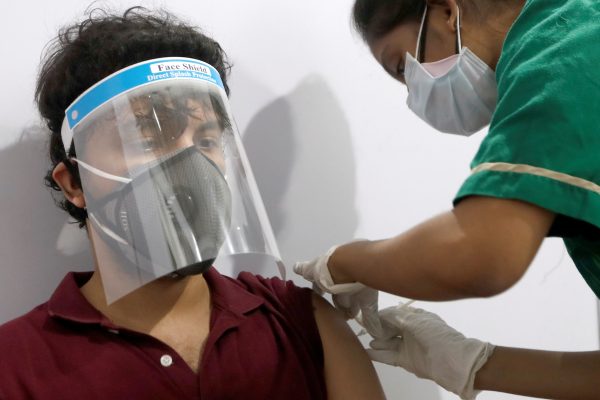Trade is a crucial element in the fight against the pandemic. Some countries, such as China, have sought credit for providing vaccines to others, while cooperation via the COVAX initiative has seen vaccines shipped from India’s Serum Institute to some of the poorest countries in the world.
But trade policy has also been a serious impediment to the free flow of vaccines, vital vaccine inputs and the knowledge behind their production.
At critical times, several countries — including the United States, the European Union and more recently India — have placed embargoes or administrative impediments on the export of vaccines. Perversely, India has also had a 10 per cent customs duty on imported vaccines.
Restrictions have also been placed on the materials needed for vaccine manufacture. In February, the invocation by the United States of the Defense Production Act — which requires US suppliers of materials and equipment for vaccine production to seek approval to export — put global access to 37 critical vaccine inputs at risk.
Adar Poonawalla, the head of India’s Serum Institute, has linked the global shortage of bioreactor bags — critical in the vaccine supply chain — to the US policy of prioritising domestic production. The potential for supply disruption through policy interference is stark: the Pfizer vaccine needs 280 components from 86 suppliers in 19 countries.
Within the ongoing debate about intellectual property rights, the United States has now expressed support for the proposal initiated at the WTO by India and South Africa to temporarily waive them on COVID-19 vaccines, including on the messenger RNA technologies used in the Pfizer–BioNTech and Moderna vaccines and on those used in the adenovirus vaccines produced by Oxford–AstraZeneca. Nevertheless, even if the waiver receives the necessary support of all 164 WTO members, this will not prevent intellectual property right restrictions from stopping developing countries from acquiring knowledge on new techniques to design vaccines and to develop the cell lines needed in vaccine manufacture.
Ensuring the free flow of necessary inputs within the supply chain is vital to fostering global vaccine production. On 14 April 2021, WTO Director-General Ngozi Okonjo-Iweala met with government and industry representatives to discuss ways of strengthening supply chains. A guiding principle in facilitating trade will be the provision in GATT Article XI that any restrictions on export be temporary, noting that even a ‘temporary’ restriction can be highly disruptive within a complex global supply chain.
More ambitiously — with a focus on facilitating cooperation rather than just avoiding restrictions — there may be scope to build on the Trade and Health Initiative proposed by a group of WTO members in late 2020. This would involve the establishment of an internationally coordinated program of fragmented and subsidised production of vaccine components.
The key here would be the need to overcome the reticence of countries that do not have the public health incentive to provide subsidies at the scale required to satisfy global demand. Those countries would only enjoy the ‘externality’ benefit of solving their own public health crisis if they were guaranteed access to other countries’ vaccine output through trade.
Further ahead, the trade regime will need to be better aligned with the pursuit of knowledge to deal with future pandemics, including those arising from variants of SARS-CoV-2, against which current vaccines are likely to be less effective.
Notwithstanding the complexities arising from the paradox of patents — namely, restricting knowledge now to increase it in the future — action is still possible that would go beyond a temporary waiver.
More should be done within the WTO to implement changes to the Trade Related Aspects of Intellectual Property Rights (TRIPS) agreement, intended to improve developing countries’ access to medicines. In 2010, India and Brazil initiated WTO dispute settlement actions and argued that repeated seizures on patent infringement grounds of generic drugs — originating in India and transiting through the Netherlands to reach other developing countries — were inconsistent with the TRIPS Agreement. The case has languished but there is still scope via TRIPS Article 31 to clarify the issue of seizure of drugs in transit.
More should also be done within preferential trade agreements to facilitate developing country access to medicines. The Trans-Pacific Partnership is a case in point. When the United States was actively involved in the negotiations, it sought a 12-year period of data exclusivity for biologic drugs, some of which are used in COVID-19 therapy.
Even with the departure of the United States from the agreement, CPTPP provisions on data exclusivity protection for biologic drugs – which many health authorities consider a significant deterrent to research and a source of increased public spending on medicines — still hang in a state of suspension.
To be fully effective, action on the trade front needs to be combined with public health reform within developing countries. The impact of COVID-19 in India for example has been accentuated by decades of underinvestment in public health infrastructure. The shortage of personnel, beds and oxygen dramatically demonstrates this. As always, trade cannot carry all the load.
Ken Heydon is a Visiting Fellow at the London School of Economics. He is a former Australian official and senior member of the OECD secretariat. He is author of The Political Economy of International Trade: Putting Commerce in Context (Polity, 2019).
This article is part of an EAF special feature series on the COVID-19 crisis and its impact.

